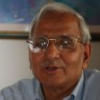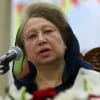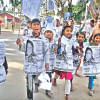Who are the candidates in the municipal elections?
On December 30, 2015, voters of 234 Paurashavas will elect, from among the constesting candidates, their representatives who will run these municipalities for the next five years. And how these institutions will be run in the coming years will determine the effectivess of our democratic system, as our Constitution mandates the creation of a democratic polity in the country by requiring institutions at all administrative units to be run by elected representatives. Thus, the question of who is running in the coming municipal elections has far-reaching implications.
Candidates constesting in municipal elections are required by law to disclose, in the form of affidavits, their antecedents, including their educational qualification, profession, criminal records, assets and liabilities of their own and their dependents. They are also required to disclose their tax returns. The purpose of these disclosures is to empower the voters with information to help them make informed decisions.
In this year's elections in 234 municipalities, 923 candidates are contesting for the post of mayor, 8,589 for councilor and 2,533 for women's reserve seats. According to the EC website, of the total 904 mayoral candidates contesting in 232 municipalities (except Mongla and Matlab), AL's nominated candidates are 221 and BNP's 206.
Because of party-based elections, the number of final mayoral candidates in the coming elections has gone down to an average of 3.94 candidates per municipality as many non-partisan, honest and locally popular candidates did not dare to contest. This compares to an average of 5.11 and 7.66 candidates in 2011 and 2008 municipal elections, respectively. Fewer candidates lower the range of choice for the voters, and they are deprived of the opportunity to pick the best representatives.
Six mayors and 134 councilors got elected uncontested in 234 municipalities - a record of sorts in municipal elections. In three municipalities of Feni district, 44 out of 48 representatives got elected unopposed allegedly because of intimidation by the ruling party, which prevented the candidates from submitting nominations or they were forced to withdraw. EC's silence in this matter raises serious doubts about its neutrality.
The two major parties of the country claim that they are committed to women's political empowerment. Nevertheless, only 15 women were nominated by these parties for the post of mayor in the municipal elections. Such a record does not speak well for our two major parties.
Another disappointing aspect of this election is that the two major parties nominated a large number of candidates with criminal records. Of the 904 candidates, 219 (24.22 percent) currently have criminal cases pending against them, and 321 (35.5 percent) had criminal cases in the past. Of them, 36 have and 61 had murder cases against them. Among AL's 221 candidates, 33 (14.93 percent), and BNP's 206 candidates, 96 (46.6 percent) presently have cases charged against them. It is claimed that many cases against BNP candidates are a result of political harassment, but it is difficult to make similar claims regarding AL candidates. Although having cases pending against one does not make someone a convict, some of the accused could ultimately be convicted. Thus, the nomination of people who are potential convicts does not speak well for the commitment of the political parties towards clean politics.
Our analysis shows that BNP candidates have had cases filed against them – including charges of murder - when compared to AL candidates, both in the past as well as present. However, although more cases are currently pending against BNP candidates, the number of past cases against candidates of both parties is nearly equal.
Of the 904 mayoral candidates, 341 (37.72 percent) have Bachelor or higher degrees. Ninety (40.72 percent) AL and 83 (40.29 percent) BNP candidates have graduate or post-graduate education. 224 (24.38 percent) of the mayoral candidacy have less than a high school education. 40 candidates of AL (18.1 percent) and 40 candidates from BNP (19.42 percent) cound not even graduate from high school. It may be noted that both AL and BNP candidates have similar educational qualifications.
Like other elections, municipality elections are also mostly dominated by businessmen – 652 (72.12 percent) candidates are businessmen; of this, AL's 165 (74.66 percent) and BNP's 162 (78.64 percent) candidates are businessmen. It is thus clear that our politics is now largely under the thumb of businessmen, which is contrary to the idea of plurality. It also indicates depoliticisation.
Among the mayoral candidates, 634 earn Tk. 5 lakh or less per year. Of the AL candidates, 125 (56.65 percent), and BNP candidates' 144 (69.9 percent) have similar levels of income. Only 8 out of 904 mayoral candidates apparently have a yearly income of Tk. 1 crore or more, which is hard to believe. Of these rich candidates, five belong to AL and two to BNP.
With respect to wealth, out of 904 candidates, 490 have declared their wealth to be worth Tk. 5 lakh or less. Among these, AL's 79 (36.57 percent) and BNP's 99 (48.77 percent) candidates have a similar level of wealth. Among all mayoral candidates, 47 (5.19 percent) - AL's 20 (9.04 percent) and BNP's 13 (6.31 percent) - have declared wealth worth Tk. 1 crore or less.
The vast majority of the candidates in the municipal elections - 80.64 percent - pay taxes, of which 181 (81.9 percent) candidates belong to AL while 169 (82.03 percent) candidates belong to BNP. This is definitely a good sign.
The disclosure of information by candidates and their analyses are important for creating awareness among voters to help them make informed decisions, but the information disclosed must be accurate. However, there are serious allegations of hiding information or disclosing inaccurate information by candidates in their affidavits. It is therefore important for the EC to take the necessary steps in the future to verify the accuracy of the disclosed information and cancel the nomination of those who file inaccurate affidavits or decertify those who were elected previously with false affidavits. At the same time, the Commission will have to, based on experience, redesign the affidavits and promptly make them available to the relevant stakeholders. Then only will the voters get the full benefit of the disclosure requirements, which have been instituted with a lot of persistent efforts by civil society and various non-government organisations.
The writer is Secretary, SHUJAN.

 For all latest news, follow The Daily Star's Google News channel.
For all latest news, follow The Daily Star's Google News channel. 








Comments